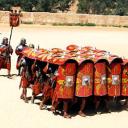Yahoo Clever wird am 4. Mai 2021 (Eastern Time, Zeitzone US-Ostküste) eingestellt. Ab dem 20. April 2021 (Eastern Time) ist die Website von Yahoo Clever nur noch im reinen Lesemodus verfügbar. Andere Yahoo Produkte oder Dienste oder Ihr Yahoo Account sind von diesen Änderungen nicht betroffen. Auf dieser Hilfeseite finden Sie weitere Informationen zur Einstellung von Yahoo Clever und dazu, wie Sie Ihre Daten herunterladen.
What does the bible mean when it says "Where their worm dieth not, and the fire is not quenched"?
10 Antworten
- susanLv 7vor 4 Jahren
I have been told that this means a person who goes to hell will live forever there, not being allowed to die.
Nobody has been able to adequately explain to me how we know that "worm" refers to a person's soul or spirit.
The reference books I consulted confirm that "worm" is a correct interpretation of the word in that passage, and that this is the only place in the Bible where that word is used.
Sorry I can't help you further. I would like to know the answer, too.
- Keith JLv 7vor 4 Jahren
That is from....
Mark 9:46
where ‘Their worm does not die,
And the fire is not quenched.’
Jesus is talking about hell, where those who refuse to believe in Jesus
go to spend eternity.... because we are eternal beings and can only live in heaven
or hell. There is no other place.
Here is more Jesus said about hell....
Matthew 10:28
And do not fear those who kill the body but cannot kill the soul. But rather fear Him who is able to destroy both soul and body in hell.
Many will be sent to Hell...
Matthew 25:41
“Then He will also say to those on the left hand, ‘Depart from Me, you cursed, into the everlasting fire prepared for the devil and his angels:
Matthew 13:49-50
49 So it will be at the end of the age. The angels will come forth, separate the wicked from among the just, 50 and cast them into the furnace of fire. There will be wailing and gnashing of teeth.”
- ?Lv 7vor 4 Jahren
It's an illustrative depiction.
The speaker (Jesus) is trying to use a word-illustration to describe eternal torment.
He is comparing eternal torment to the valley of "Gehenna" or "the Son of Hinnom". Some teach (I don't know how reliable the teaching is) that in that valley at that time was a sort of burning refuse heap for the city of Jerusalem.
In any case, Jesus is describing eternal torment with a word-illustration, and he does so by claiming that the torments there - unlike in the physical world - do not end. So: in this place of eternal torment ***in an attempt to portray the horrible and never-ending nature of that torment*** Jesus paints the word-picture of worms (that eat the bodies of the dead) that do not die and fires (that burn) that never "go out".
Conclusion:
Basically: Jesus is trying to make this place of eternal torment sound as horrifying as possible and he is trying to convey the idea that the torment is never-ending, without surcease or pause. He uses a word-illustration and the real-world analogy of worms and fire to convey those ideas.
- FuzzyLv 7vor 4 Jahren
If you look at this kind of phrasing, and what is left in archaeological remains, the meaning becomes evident.
In Jude, he speaks about Sodom and Gomorrah:
"7 as Sodom and Gomorrha, and the cities around them, committing greedily fornication, in like manner with them, and going after other flesh, lie there as an example, undergoing the judgment of eternal fire. "
Here you see "eternal fire" being mentioned, it is similar to your quote of "the fire is not quenched." Yet, we can actually go and look at the remains of Sodom and Gomorrah. There is no fire, however, there remains the total destruction which will not be undone. In that sense, their fire is eternal, or even 'not quenched."
We have to interpret the Bible passages like that with other things as I just demonstrated. So, if their worm dieth not, we can accept that these people are going to be dead for all eternity and not resurrected.
- Wie finden Sie die Antworten? Melden Sie sich an, um über die Antwort abzustimmen.
- CFLv 7vor 4 Jahren
The original Greek word translated “hell” at Mark 9:47 is Geʹen·na. This word comes from the Hebrew Geh Hin·nomʹ, meaning “Valley of Hinnom.” The Valley of Hinnom hugged the outskirts of ancient Jerusalem. In the days of the Israelite kings, it was used for child sacrifice—a disgusting practice that God condemned. God said that he would execute those who performed such an act of false worship. The Valley of Hinnom would then be called “the valley of slaughter,” where “the carcases of this people” would lie unburied. (Jeremiah 7:30-34, King James Version) Jehovah thus foretold that the Valley of Hinnom would become a place, not for the torture of live victims, but for the mass disposal of dead bodies.
In Jesus’ day, the inhabitants of Jerusalem used the Valley of Hinnom as a garbage dump. They threw the bodies of some vile criminals into this dump and kept a fire constantly burning there to dispose of the refuse and the carcasses.
When Jesus spoke of the undying worms and unquenchable fire, he was apparently alluding to Isaiah 66:24. Regarding “the carcases of the men that have transgressed against [God],” Isaiah says that “their worm shall not die, neither shall their fire be quenched.” (KJ) Jesus and his listeners knew that these words in Isaiah referred to the treatment of the carcasses of those not deserving a burial.
Therefore, Jesus used the Valley of Hinnom, or Gehenna, as a fitting symbol of death without hope of a resurrection. He drove this point home when he warned that God “can destroy both soul and body in Gehenna.” (Matthew 10:28, NAB) Gehenna is a symbol of eternal death, not eternal torture.
- Anonymvor 4 Jahren
"Where their worm dieth not, and the fire is not quenched" is imagery used to emphasize the fact that the unsaved will not be rescued. They WILL be completely annihilated. The Bible offers two possibilities for all of us. Everlasting LIFE. Or DEATH. Not Everlasting LIFE somewhere nice - and Everlasting LIFE somewhere NOT nice. And once we leave the life that we know [the one you and I are presently experiencing] that decision will have been made.
- RickLv 7vor 4 Jahren
Jesus was referring to Isaiah 66:24 the worms feed on dead flesh and the fire is allowed to completely consume. It is a picture of total destruction.
- 🤔 JayLv 7vor 4 Jahren
Why would we need to re-interpret the vagueness of ancient folklore and myth? It's been bantered about and interpreted for over 2500 years...
What possible gain are you looking for?
Reading the Bibles is a good thing. It seeds atheism...
- vor 4 Jahren
I've seen two.different interpretations. The one I know is that the worm symbolizes the spirit





